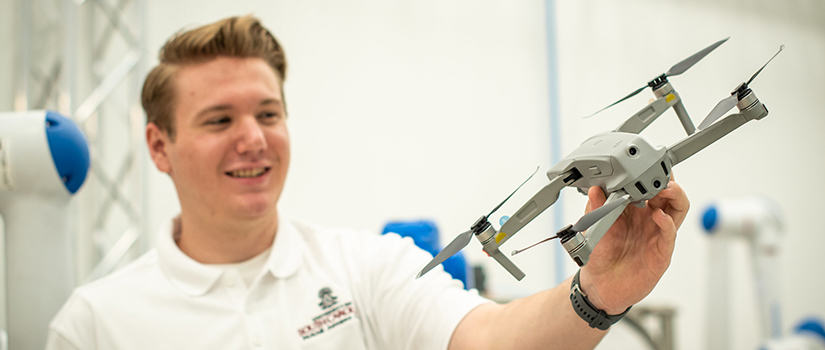Undergraduate work integral to university research efforts
Seven undergraduate students from the College of Engineering and Computing have been awarded grants from the NASA SC Space Grant Consortium in furtherance of their research in the areas of composite manufacturing and future factories.
The students are part of the New and Emerging X Technologies Research team (neXt) at UofSC’s McNAIR Center. Each received the full award amount of $7,500 and will conduct his or her research with the support of CEC faculty mentor and research advisor Ramy Harik. Research will begin this summer or fall depending on student availability.
Harik underscores that these grants are significant not only in their recognition of student work, but also in emphasizing the importance of undergraduate research. He said, “Research is essential to students’ technical skills, professional skills and development of attachment to university and profession like no other. It helps them begin to understand what they like to work on, formalize that research, submit proposals and pursue financial support in furtherance of their work.”
The award recipients and their research topics are as follows:
Devon Clark, Investigation of 3D Printing Manufacturing Optimization Through Remote Robotic Control
Steve Matthew Howard, Investigating the Use of Electronic Sensors in Predictive Maintenance
Nick Johnson, AFP Off-Part Time Mitigation Using Mobile Augmented Reality and Motion Tracking
Adam Quin, Investigating Methods to Monitor and Increase the Efficiency of a Pneumatic Gripper System in a Manufacturing Simulation Lab
Drew Sander, Enabling Future Factories through Smart Drone Inspection
Noah Swingle, Optimizing Laminate Level Layup Strategy Through Stacked Defect Mitigation
Kevin Zimovan, Investigation of the Influence of Roller Compaction on Quality of Defects in Automated Fiber Placement of Aerospace Structures
Harik says that grants such as these are important because they help engage more students in science education. Nick Johnson, for instance, transferred to UofSC from Midlands Technical College after learning of research Harik shared on LinkedIn. Drew Sander attended UofSC’s aerospace camp as a high school student, which created a lasting impact that led him to the path he is on today.
Noah Swingle said, “Research has really defined my experience as an undergraduate. My main project is on expanding the capabilities of a piece of software that aids in composite manufacturing. As a mechanical engineering major, software development is a bit tangential to my curriculum, meaning everything I do I have to teach myself. This process of self-guided education is incredibly rewarding as you can go from knowing nothing to writing a program that works in just a few months.”
Devon Clark said, “Being a part of the neXt research team has given me so many opportunities to work with a talented and inspiring team. It allows me to focus my time and energy on a topic that interests me, and to try and produce something that can benefit not only my lab, but other labs as well. It is also giving me an opportunity to learn how to not only work with other engineers, but to also lead my own project.”
Harik explains that undergraduate students are an essential component of the university’s research program and encourages others to get involved. He said, “Undergraduate students belong in our research system and the system embraces them. These students are all in the domain of advanced manufacturing, working on real issues faced by industry today. Any undergraduate student should talk to your professors, look for a research project, get integrated. It will make your four years the best experience ever.”
The NASA SC Space Grant Consortium was formed in 1991 and works to increase South Carolina’s aerospace related research infrastructure. Consortium members devise programs to encourage researchers and students to conduct aerospace related research and to address the science education pipeline problem. The undergraduate research award is designed to increase the number of highly trained scientists and engineers and enable undergraduate students to conduct NASA-related research.
Ramy Harik is an associate professor of mechanical engineering in the College of Engineering and Computing. He is a Fulbright Alumni and a resident researcher at the McNAIR Center for Aerospace Innovation and Research. He has been named the UofSC Distinguished Undergraduate Research Mentor for 2021.
